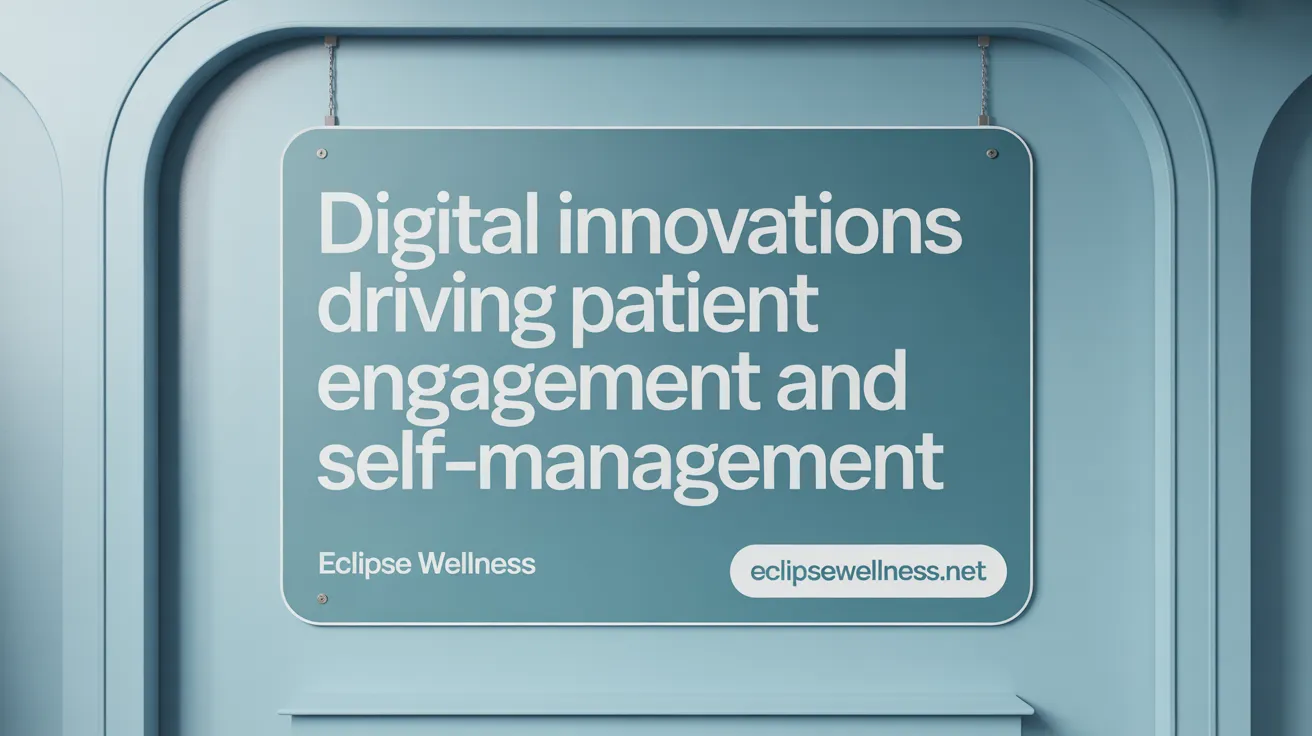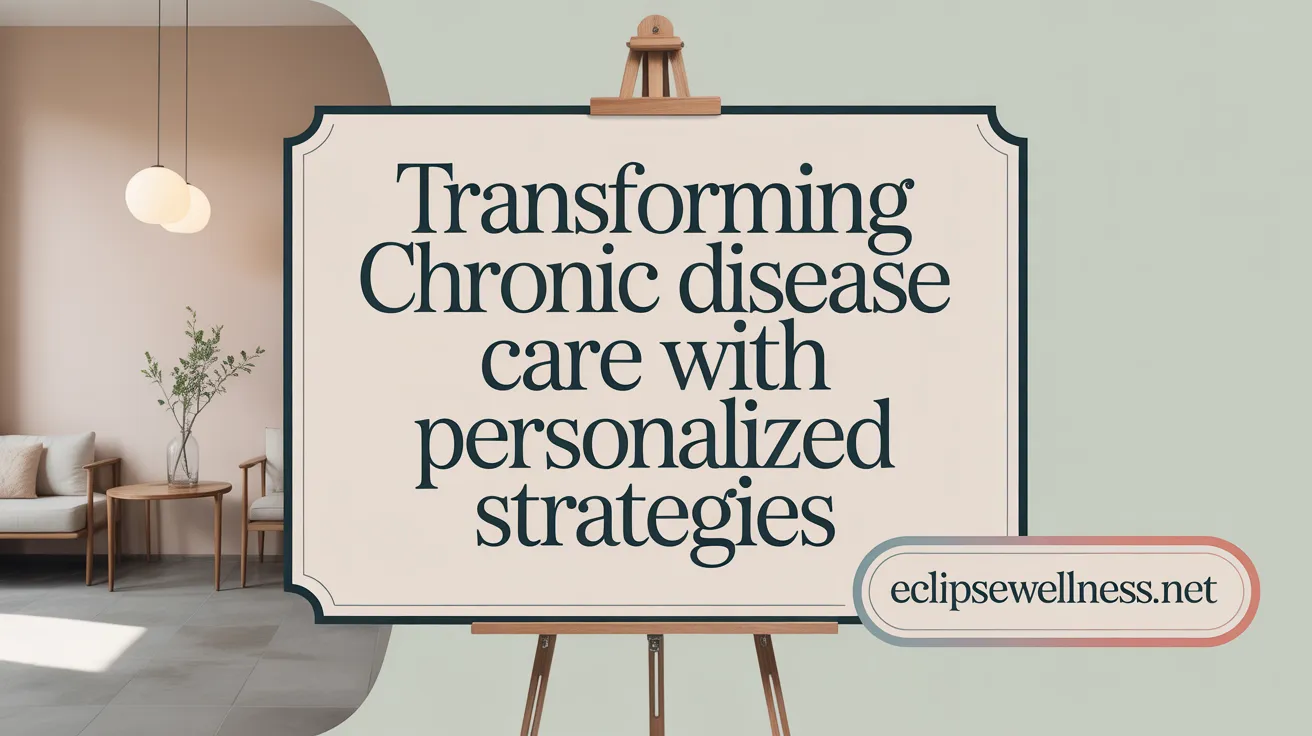Introduction to Personalized Healthcare and Patient Engagement
Understanding Personalized Healthcare
Personalized healthcare is a proactive approach that tailors medical care to an individual's unique genetic profile, medical history, lifestyle, and social determinants of health. It designs customized wellness plans that not only treat diseases but aim to prevent them, enhancing overall quality of life while minimizing unnecessary testing and hospital visits.
The Importance of Patient Engagement
Patient engagement is central to this model, empowering individuals to actively participate in their health management. Engaged patients are more likely to adhere to care plans, participate in preventive screenings, and collaborate confidently with care providers. This collaboration fosters trust and leads to better clinical outcomes.
Technology and Data as Enablers
Advances in technology and data analytics are pivotal in enabling personalized healthcare. Tools such as wearable devices, artificial intelligence, electronic health records, and digital health apps collect and integrate diverse data sources—from genomics to lifestyle behaviors. These technologies support early risk detection, ongoing monitoring, and personalized communication, effectively bridging gaps in care and supporting sustained behavior change.
Through this combination of patient-centered strategies and technological innovation, personalized healthcare is shaping a future that prioritizes wellness, prevention, and tailored treatment plans.
The Foundations of Personalized Healthcare in Modern Medicine

How is genetic, lifestyle, and clinical data used in personalized healthcare?
Personalized healthcare integrates genetic profiles, lifestyle habits, and clinical history to tailor health plans specifically for each individual. By analyzing genetic variations and biomarkers, providers can predict disease risks and treatment responses. Lifestyle factors such as diet, physical activity, and social determinants of health are combined with clinical data to create holistic plans that support prevention and management of chronic conditions. This comprehensive data approach fosters more precise interventions that reflect the uniqueness of each patient’s health status.
What role do preventive care and early disease detection play?
Preventive strategies are central to personalized healthcare, focusing on early identification of health risks before symptoms arise. This proactive approach aims to intervene during the early stages of disease development, improving outcomes and reducing unnecessary treatments and hospitalizations. By addressing risks timely, personalized care not only enhances quality of life but also reduces healthcare costs. Tailored screening and lifestyle recommendations help patients maintain wellness and avoid progression of chronic diseases.
How do health risk assessments and wellness visits support this foundation?
Annual Wellness Visits (AWVs) and Health Risk Assessments (HRAs) are instrumental tools in personalized healthcare. They provide systematic evaluation of patients’ familial history, medical conditions, behavioral health, and social factors. These assessments identify care gaps and specific risks, facilitating the creation of individualized wellness plans. By fostering dialogue and shared goal setting during these visits, providers and patients collaborate to optimize health management. Programs like Chronic Care Management further extend personalized support by maintaining ongoing communication and adaptive interventions beyond clinic visits.
Overall, the foundation of personalized healthcare lies in leveraging multidimensional patient data, emphasizing prevention, and employing structured assessments to empower patients and clinicians in a patient-centered care partnership.
Technology as a Catalyst for Personalized Patient Engagement

Digital Tools for Patient Identification and Monitoring
Digital technology plays a pivotal role in personalizing patient care by enabling efficient identification of eligible patients and continuous monitoring of their health status. Healthcare providers utilize advanced digital platforms that consolidate data from multiple sources to create comprehensive patient profiles. These tools support targeted outreach with meaningful calls to action, helping patients stay engaged and informed about their care plans. Moreover, digital health apps, coaching programs, and monitoring devices facilitate symptom tracking and behavioral change, enhancing patients' self-management abilities.
AI and Data Analytics in Personalized Care
Artificial intelligence (AI) and data analytics are integral to delivering personalized healthcare. AI algorithms analyze vast and diverse datasets—including genetic information, clinical history, and social determinants of health—to identify individual health risks and tailor treatment strategies. These technologies empower healthcare teams to design precise wellness plans, optimize medication regimens, and predict disease progression. AI also enhances communication by supporting personalized patient outreach across preferred channels and facilitating better care coordination among providers and patients (AI in personalized healthcare, Personalized healthcare benefits).
Wearable Devices and Remote Patient Monitoring
Wearable health devices and remote patient monitoring systems enable continuous, real-time tracking of biometric data such as heart rate, blood glucose, and activity levels. These technologies extend personalized care beyond clinical settings, allowing patients and providers to monitor health trends and intervene early when needed. Remote monitoring is especially valuable for managing chronic conditions, offering a convenient and proactive approach. By integrating Wearables and remote patient monitoring, healthcare organizations deliver adaptive, patient-centered care that promotes sustained engagement and improved outcomes.
Personalized Communication Strategies Driving Engagement
Tailored Communication Channels and Content
Personalized communication in healthcare involves customizing messages and interactions to align with individual patient needs, preferences, and cultural factors. By developing detailed patient profiles and segmenting patients, healthcare providers can deliver relevant, meaningful information that resonates with each person. Tailored content may include reminders for screenings, education about treatments, or wellness tips designed specifically for the patient's conditions and lifestyle. For further insights, see Personalized communication and patient engagement strategies.
Multi-Channel Outreach (Email, SMS, Portals)
Using a variety of communication channels enables broader patient reach and convenience. Email, SMS, and patient portals are common methods to deliver health information and engage patients. Personalized messages sent via preferred channels enhance accessibility and patient responsiveness. For example, appointment reminders or medication alerts delivered through SMS increase adherence, while portals provide secure access to health data and educational resources. Combining channels supports consistent, relevant contact that empowers patients. Explore more on Patient engagement technology and digital tools, and Patient portals, mobile health apps, and telehealth.
Building Trust and Emotional Connections with Patients
Effective personalization fosters a sense of being seen and valued, which builds trust and strengthens the patient-provider relationship. Empathy, active listening, and two-way communication are essential human strategies complementing technology. When patients feel emotionally connected to their care team and receive information tailored to their journey, they are more likely to participate actively, adhere to treatment plans, and experience improved satisfaction. This connection also supports better health outcomes and patient well-being. For a deeper understanding, read about The role of personalization in healthcare and patient engagement and Patient engagement and empowerment in healthcare.
Integrative and Holistic Approaches Supporting Personalized Care
Integrating Conventional and Complementary Therapies for Personalized Care
integrative medicine blends conventional medical treatments with complementary therapies, creating a tailored approach that treats the whole person rather than just symptoms. This model often incorporates evidence-based practices such as meditation, acupuncture, massage therapy, herbal supplements, and functional nutrition alongside standard clinical care. By combining these diverse modalities, healthcare providers can address complex and chronic conditions more effectively, improving patient outcomes and satisfaction.
Emphasizing Whole-Person Health: Mind, Body, and Spirit
Personalized care thrives when it considers the full spectrum of patient needs—physical, mental, emotional, and spiritual. This holistic focus supports improved well-being by managing factors like stress, fatigue, pain, and anxiety that influence health beyond biological symptoms. Therapies like yoga, tai chi, guided imagery, and mindfulness meditation enhance relaxation and promote self-healing. Addressing these interconnected dimensions creates a supportive environment for sustainable behavior change and health maintenance.
Collaborative Patient-Provider Partnerships
Effective integrative care depends on strong partnerships between patients and healthcare teams. Personalized care plans are developed collaboratively, honoring patient preferences, values, and cultural backgrounds. This partnership fosters trust and empowers patients to participate actively in their treatment, encouraging adherence and self-management. Open communication ensures coordination among multidisciplinary providers, aligning conventional and complementary methods safely and effectively to optimize health outcomes (Patient Engagement and Collaborative Patient-Provider Relationships).
Empowering Patients through Education and Digital Health Platforms
Personalized educational content and health coaching
Personalized educational content tailors health information and coaching to fit individual patient needs, improving understanding and engagement. Care management teams utilize diverse strategies, such as batch outreach for common conditions or tagging content based on clinical codes, enabling targeted education for specific diagnoses like knee pain or cancer screenings. This tailored approach fosters trust and empowers patients to actively participate in their care journey.
Digital platforms offering real-time health data and feedback
Digital health platforms provide patients with access to real-time biometric data, including blood pressure, glucose levels, and weight, through connected devices and apps. These tools often include functionalities such as personalized risk assessments, goal setting, and progress tracking, offering timely alerts and motivational feedback. By enhancing patient-provider communication, these platforms help sustain behavior change and improve adherence to treatment plans.
Supporting management of social determinants of health (SDOH)
Effective personalized care also addresses social determinants of health, including transportation, cultural factors, and socioeconomic challenges. Digital platforms and health coaching integrate support for these factors by delivering culturally sensitive educational materials and coordinating resources. This holistic approach supports patients’ ability to overcome barriers, maintain engagement, and achieve better health outcomes.
Through the integration of personalized education, interactive digital tools, and social support, patients gain greater agency and confidence, facilitating successful self-management and improving overall health and quality of life.
Impact of Personalized Care on Chronic Disease Management and Outcomes

How does personalized care address chronic diseases effectively?
Personalized care involves tailoring medical interventions specifically to each patient's unique health profile, including their genetic makeup, lifestyle, and environmental factors. This approach is especially important in managing chronic diseases such as diabetes, hypertension, and arthritis, where one-size-fits-all treatments often fail to achieve optimal outcomes.
By integrating detailed patient data, clinicians develop individualized care plans that precisely target an individual's risks and needs. This includes customized medication regimens, lifestyle recommendations, and preventive strategies that help slow disease progression and minimize complications. For more on individualized wellness plans and early disease detection, see this resource.
What clinical improvements result from patient engagement in personalized care?
Engaging patients actively in their own healthcare leads to measurable improvements in clinical markers. Studies show that interventions focused on increasing patient engagement over short periods (6–8 weeks) can improve biological outcomes such as HbA1C levels in diabetes, blood pressure in hypertension, and pain control in arthritis. The role of patient engagement and activation is crucial here.
Patient engagement empowers individuals with the knowledge, skills, and confidence needed to manage symptoms effectively and adhere to treatment plans. Digital tools like mobile apps, telehealth platforms, and personalized reminders support this engagement by fostering continuous self-monitoring and behavioral change, as explored in Digital Tools for Patient Engagement.
What role do care managers and continuous communication play in chronic disease management?
Care managers are vital in delivering personalized care by maintaining regular communication with patients beyond clinic visits. Through Chronic Care Management (CCM) programs, care managers provide tailored lifestyle advice, monitor ongoing progress, and address social determinants of health such as transportation or economic barriers.
Continuous communication fosters a trusting patient-provider relationship, offering emotional support that enhances motivation and adherence. By leveraging digital platforms for reminders, educational resources, and symptom tracking, care managers ensure that patients stay engaged and timely adjustments to care plans are made. Learn more about the importance of personalized communication and patient engagement strategies.
Overall, personalized care combined with proactive patient engagement and dedicated care management results in improved clinical outcomes, reduced hospitalizations, and enhanced quality of life for individuals managing chronic diseases. For comprehensive insights into personalized healthcare and patient-centered care, this resource provides foundational knowledge.
Addressing Barriers and Challenges in Personalized Patient Engagement
Staffing Shortages and Digital Solutions
The healthcare sector faces significant staffing shortages, a challenge that has been intensified by the COVID-19 pandemic. Personalized digital tools serve as valuable supplements to human care, offering automation in patient identification, engagement, and continuous monitoring. Technologies such as artificial intelligence (AI), remote monitoring devices, and health apps help maintain care quality while alleviating pressure on healthcare staff. These innovations enable efficient outreach and support patient self-management, thus improving engagement even when provider resources are limited (Improving Patient Engagement Digitally, Addressing Staffing Shortages with Automation).
Digital Literacy and Socioeconomic Disparities
A critical barrier to effective patient engagement is variable digital literacy among patients, which often aligns with socioeconomic disparities. Lower-income groups and certain minority populations may face challenges in accessing or using digital health technologies, which can lead to gaps in care. Tailoring communication channels and educational content to diverse patient needs and preferences—including providing simple, clear instructions and combining digital with in-person engagement—helps bridge these divides. Ensuring equitable access to user-friendly platforms is essential to prevent widening health inequities (Patient Engagement and Healthcare Disparities, Inclusive Health Data Access, Technology in Healthcare Communication).
Ethical and Privacy Considerations in Data Use
The use of extensive patient data—including genetic, clinical, and social information—is foundational to personalized care. However, harnessing this data raises concerns around privacy, security, and ethical management. Safeguarding patient information requires comprehensive data governance, secure technology infrastructures, and transparent policies. Patients must be empowered with knowledge about how their data is used, fostering trust and encouraging active participation. Ethical stewardship of sensitive data ensures personalized healthcare remains patient-centered and respects individual rights (Ethics and Data Privacy in Personalized Medicine, Patient Engagement and Data Security, Empowering Patients through Data).
Future Trends: AI, Genomics, and Emerging Technologies in Personalized Care

Advances in Artificial Intelligence and Machine Learning
Artificial intelligence (AI) and machine learning are transforming personalized healthcare by analyzing large, complex datasets such as electronic health records, genomic profiles, and patient-reported outcomes. These technologies enable clinicians to predict disease risks, optimize treatments based on individual responses, and enhance clinical decision-making. AI-powered tools streamline care coordination, support medication adherence, and facilitate proactive patient engagement, leading to improved health outcomes and minimized adverse effects (Artificial intelligence in healthcare, Precision Medicine and AI integration).
Integration of Genomics and Biomarkers
The expanding role of genomics and biomarker research is central to tailoring medical interventions. Individual genetic profiles, combined with molecular biomarkers, allow precise risk stratification and development of targeted therapies across conditions like cancer and neurodegenerative diseases. Personalized treatment plans incorporate pharmacogenomics to select medications with higher effectiveness and fewer side effects, while novel diagnostic tools such as liquid biopsies and single-cell analyses refine disease monitoring (Personalized medicine, Genomic analysis in clinical trials, Genetic testing and biomarkers).
Expansion of Wearable Health Technologies
Wearable devices and digital health apps play a critical role in continuous patient monitoring and engagement. These technologies collect real-time biometric data—such as heart rate, glucose levels, and physical activity—which AI systems analyze to provide personalized feedback and early warning signals. By empowering patients with accessible health insights and supporting remote monitoring, wearables contribute to sustained behavior change, chronic disease management, and seamless integration of care workflows (Wearables and Digital Health Apps, Wearables and Remote Patient Monitoring, Remote Patient Monitoring).
Together, these innovations foster a patient-centered, data-driven paradigm where personalized care is dynamic, precise, and accessible, ultimately advancing population health and patient empowerment (Personalized Patient Experience, Patient engagement).
Conclusion: The Transformative Potential of Personalized Healthcare in Patient Engagement
Advancements and Benefits of Personalized Healthcare
Personalized healthcare harnesses genetic information, lifestyle data, and advanced technologies such as AI and wearable devices to tailor medical care uniquely to each individual. This approach results in early disease detection, more precise treatments, reduced side effects, and lowered healthcare costs. Digitally enabled personalized outreach enhances patient engagement by delivering timely, relevant communication and empowering patients in their health management (Personalized Healthcare, Precision Medicine and AI integration, Personalized Patient Experience.
Enhanced Patient Satisfaction and Outcomes
When healthcare is tailored to patient needs—incorporating personal preferences, social determinants, and clinical data—patients experience improved satisfaction, adherence, and trust in their care teams. Personalized care plans support sustained behavior change, better clinical outcomes, and a stronger sense of ownership over health. This creates an environment where patients feel valued and actively engaged, translating into fewer preventable complications and readmissions (Personalized Patient Experience, Patient Engagement, Patient engagement).
A Call for Holistic, Technology-Enabled Care Models
The future lies in integrated care systems that combine conventional medicine, complementary therapies, and digital health tools to deliver holistic and individualized care. Multidisciplinary teams, supported by data-driven insights and AI-powered personalization, can optimize patient outcomes while addressing mental, emotional, and social health. Embracing these technology-enabled, patient-centered approaches is essential to transforming healthcare delivery—improving experiences while reducing costs and improving overall quality of life (integrative medicine, Healthcare Technology Infrastructure, Role of personalization in the care journey).
Closing Reflections on Personalized Healthcare and Patient Engagement
Continued innovation remains vital in advancing personalized healthcare, harnessing emerging technologies like AI, genomics, and digital health tools to deepen understanding of individual needs.
This drive fosters more precise interventions, supports proactive disease prevention, and enhances ongoing patient monitoring. Integrating these innovations with holistic approaches ensures treatment addresses physical, emotional, and social dimensions, improving overall well-being.
Central to this evolution is the commitment to patient-centered care, emphasizing collaboration between patients, providers, and multidisciplinary teams.
This partnership nurtures patient empowerment and engagement—key factors that enable shared decision-making, promote self-management, and build trust. Tailoring care plans to each person's unique context—medical history, lifestyle, values, and social determinants—strengthens adherence and satisfaction.
Looking forward, the vision for personalized healthcare prioritizes broader access and greater health equity.
Efforts to reduce barriers, including technological disparities and cultural differences, are essential. Expanding educational initiatives and culturally competent care models support inclusivity. By weaving together innovation, collaboration, and equitable access, healthcare can realize its full potential to improve outcomes for all individuals, fostering healthier communities and more sustainable systems.
